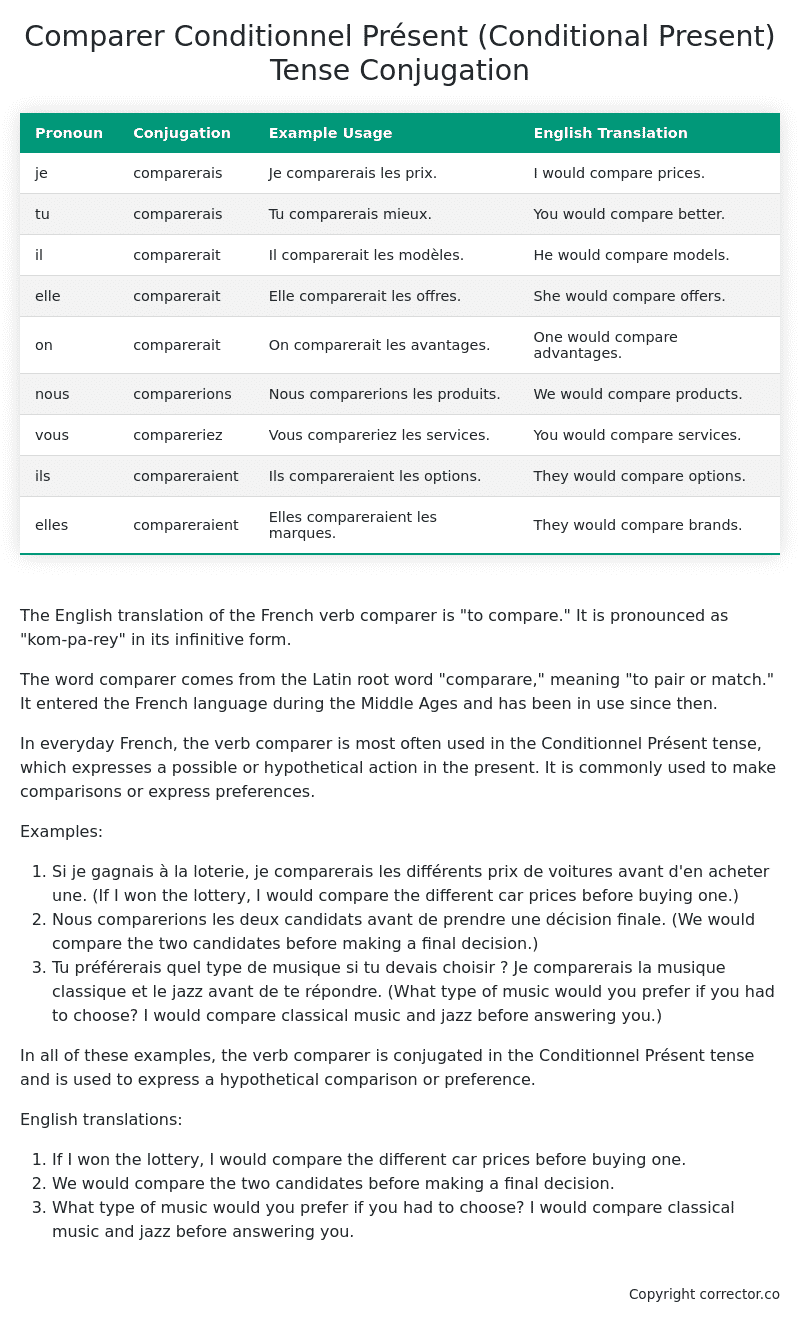Conditionnel Présent (Conditional Present) Tense Conjugation of the French Verb comparer
Introduction to the verb comparer
The English translation of the French verb comparer is “to compare.” It is pronounced as “kom-pa-rey” in its infinitive form.
The word comparer comes from the Latin root word “comparare,” meaning “to pair or match.” It entered the French language during the Middle Ages and has been in use since then.
In everyday French, the verb comparer is most often used in the Conditionnel Présent tense, which expresses a possible or hypothetical action in the present. It is commonly used to make comparisons or express preferences.
Examples:
- Si je gagnais à la loterie, je comparerais les différents prix de voitures avant d’en acheter une. (If I won the lottery, I would compare the different car prices before buying one.)
- Nous comparerions les deux candidats avant de prendre une décision finale. (We would compare the two candidates before making a final decision.)
- Tu préférerais quel type de musique si tu devais choisir ? Je comparerais la musique classique et le jazz avant de te répondre. (What type of music would you prefer if you had to choose? I would compare classical music and jazz before answering you.)
In all of these examples, the verb comparer is conjugated in the Conditionnel Présent tense and is used to express a hypothetical comparison or preference.
English translations:
- If I won the lottery, I would compare the different car prices before buying one.
- We would compare the two candidates before making a final decision.
- What type of music would you prefer if you had to choose? I would compare classical music and jazz before answering you.
Table of the Conditionnel Présent (Conditional Present) Tense Conjugation of comparer
| Pronoun | Conjugation | Example Usage | English Translation |
|---|---|---|---|
| je | comparerais | Je comparerais les prix. | I would compare prices. |
| tu | comparerais | Tu comparerais mieux. | You would compare better. |
| il | comparerait | Il comparerait les modèles. | He would compare models. |
| elle | comparerait | Elle comparerait les offres. | She would compare offers. |
| on | comparerait | On comparerait les avantages. | One would compare advantages. |
| nous | comparerions | Nous comparerions les produits. | We would compare products. |
| vous | compareriez | Vous compareriez les services. | You would compare services. |
| ils | compareraient | Ils compareraient les options. | They would compare options. |
| elles | compareraient | Elles compareraient les marques. | They would compare brands. |
Other Conjugations for Comparer.
Le Present (Present Tense) Conjugation of the French Verb comparer
Imparfait (Imperfect) Tense Conjugation of the French Verb comparer
Passé Simple (Simple Past) Tense Conjugation of the French Verb comparer
Passé Composé (Present Perfect) Tense Conjugation of the French Verb comparer
Futur Simple (Simple Future) Tense Conjugation of the French Verb comparer
Futur Proche (Near Future) Tense Conjugation of the French Verb comparer
Plus-que-parfait (Pluperfect) Tense Conjugation of the French Verb comparer
Passé Antérieur (Past Anterior) Tense Conjugation of the French Verb comparer
Futur Antérieur (Future Anterior) Tense Conjugation of the French Verb comparer
Subjonctif Présent (Subjunctive Present) Tense Conjugation of the French Verb comparer
Subjonctif Passé (Subjunctive Past) Tense Conjugation of the French Verb comparer
Subjonctif Imparfait (Subjunctive Imperfect) Tense Conjugation of the French Verb comparer
Subjonctif Plus-que-parfait (Subjunctive Pluperfect) Tense Conjugation of the French Verb comparer
Conditionnel Présent (Conditional Present) Tense Conjugation of the French Verb comparer (this article)
Conditionnel Passé (Conditional Past) Tense Conjugation of the French Verb comparer
L’impératif Présent (Imperative Present) Tense Conjugation of the French Verb comparer
L’infinitif Présent (Infinitive Present) Tense Conjugation of the French Verb comparer
Struggling with French verbs or the language in general? Why not use our free French Grammar Checker – no registration required!
Get a FREE Download Study Sheet of this Conjugation 🔥
Simply right click the image below, click “save image” and get your free reference for the comparer Conditionnel Présent tense conjugation!

Comparer – About the French Conditionnel Présent (Conditional Present) Tense
Formation
Common Everyday Usage Patterns
Expressing Polite Requests
Expressing Hypothetical Situations
Expressing Doubt or Uncertainty
Interactions with Other Tenses
Present Tense
Past Tense
Future Tense
Conditional Perfect
Summary
Want More?
I hope you enjoyed this article on the verb comparer. Still in a learning mood? Check out another TOTALLY random French verb conjugation!


